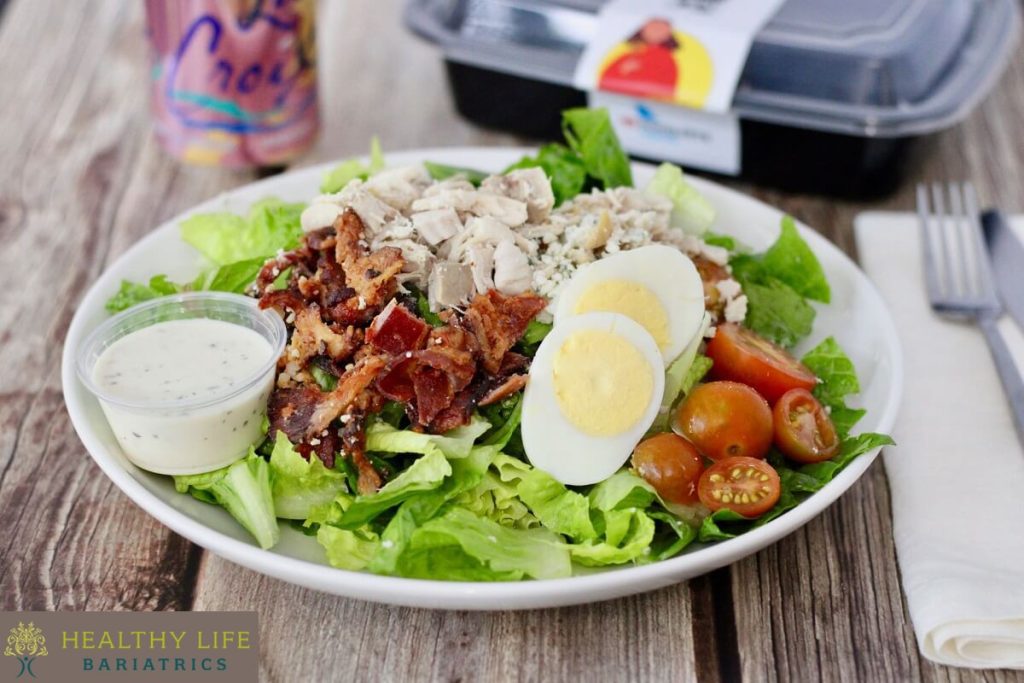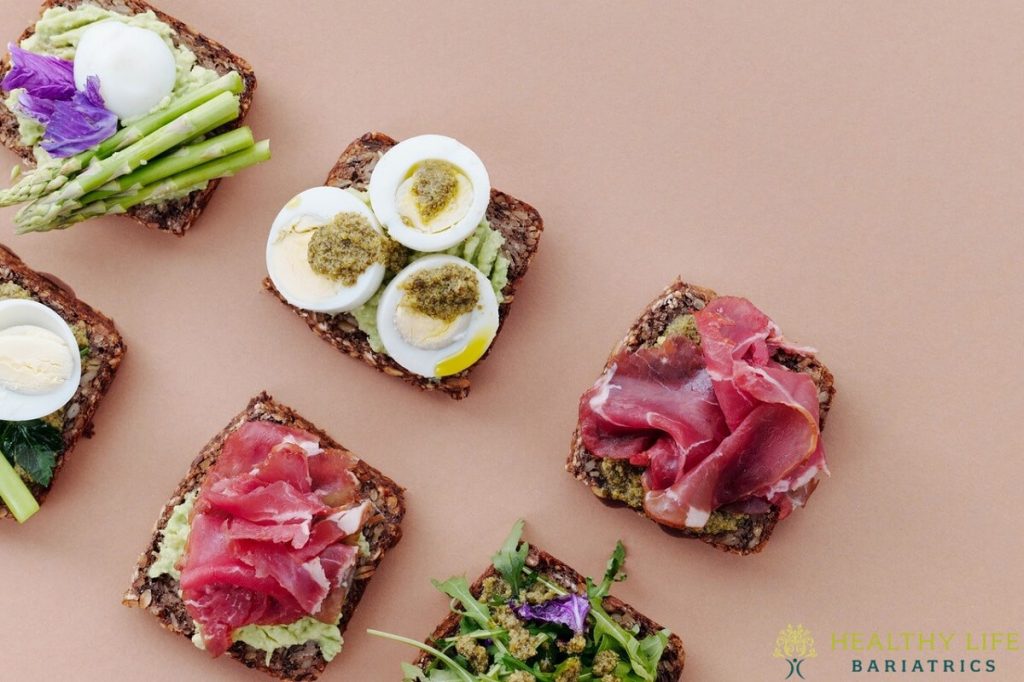
Even after losing weight via bariatrics, many bariatric surgery patients fear they will gain the weight back all over again. That never-ending cycle of weight loss and regain spurred many patients to seek out bariatric surgery in the first place. You may think, “Is it possible to regain all the weight after losing it through a gastric sleeve or a similar surgery?”
While losing around 50% of your excess weight (which can amount to 100 pounds or more) is possible, some weight regain is possible. A recent study observed weight regain in 50% of patients among those diagnosed with super morbid obesity (body mass index (BMI) of 50+). For instance, if you are 4’10” and weigh 239 pounds, you would be considered super morbidly obese.
Weight regain is not guaranteed; however, you can minimize the amount of the weight that comes back. These tips will help you adopt the habits that come with significant and long-term weight loss following bariatric surgery.

Filling your diet with healthy proteins is vital to your overall health. Protein helps your body build blood, bones, muscles, and skin. When it comes to weight loss and keeping the weight off, protein helps you feel full faster and longer.
When shopping at the grocery store and eating out, fill your shopping cart and order off the menu as many protein-rich foods as you can. Examples include plain Greek yogurt, white-fleshed fish, lean beef, lite tofu, eggs, non-fat milk, low-fat cottage cheese, and skinless, white-meat poultry.
Studies show that tracking your food helps you lose up to twice as much weight as those who don’t track their calories. Using an app makes protein tracking easy. You will only need to search for the food, and the app will calculate the amount of protein you eat. This can be especially handy when eating out (more on that in a bit).
How much protein should you eat? The CDC recommends getting 10% to 35% of your calories from protein. That amounts to roughly 56 grams of protein for adult men versus 46 grams for women.
Humans have been eating whole grains for tens of thousands of years. So, don’t pay attention to the unfortunate trend of thinking that all carbohydrates are bad. Eating healthy whole grains gives you the vitamins, minerals, and other nutrients you need to remain healthy. Whole grains also contain fiber, reducing your risk of cancer, heart disease, and diabetes.
Whole grains include quinoa, faro, bulgur, and brown rice. Some cereals are also acceptable if they contain at least five servings of fiber per serving.
You may find that you are lactose intolerant after weight loss surgery. Therefore, instead of milk, your bariatric surgeon may recommend that you consume soy milk and low-lactose milk alternatives, like Lactaid.
During meals or between, reach for high-fiber fruit options such as raspberries, blueberries, blackberries, strawberries, pears, apples, oranges, and avocados. For a healthy snack full of fiber and protein, consider adding protein-rich Greek yogurt or cottage cheese to one serving of fresh fruit.
Stick to low-carb veggies packed with fiber, flavonoids, and antioxidants. Filling your plates with these vegetables will consume fewer calories while eating more food. Delicious vegetables to fill your plate include broccoli, asparagus, green beans, cauliflower, bell peppers, tomatoes, and spinach.
You will want to avoid eating foods high in fat or sugar if you are concerned about weight regain. To achieve optimal weight loss results, push the following poor food choices away from the table when offered.
Eating low-fat foods can help prevent heartburn, elevated cholesterol, and weight regain. Foods to fill your fridge and pantry with include beans, legumes, sweet potatoes, garlic, mushrooms, white fish, chicken breast, and egg whites. You can also use small amounts of low-fat condiments to boost the taste of your meals, such as non-stick cooking spray, reduced-fat salad dressings, and light mayonnaise.
Instead of eating three mega meals each day, stick to mini meals. Eat these tinier portions more often, and you’ll remain full all day. You’ll be less likely to overeat, and it’s not snacking if it’s an actual meal!
Smaller, more frequent meals can boost your metabolism, helping you lose weight and keep it off. Eating smaller meals becomes easier if you can plan each meal. Meal prepping is one method you can use.
Pick a day each week, such as Sunday, to prepare your weekly meals. Use plastic containers with partitions for small portions you can use to pack fruits, veggies, protein, whole grains, and the occasional condiment. Put these containers in the fridge to keep them within easy reach the next time you need a ready meal.
While many people refer to their eating patterns after weight loss surgery as their “post-surgery diet,” this is a mistake. Don’t think of your eating habits as a diet; you’ll be more likely to think of it as a temporary change. For long-term weight loss success, you should aim to form entirely new eating habits.
To make healthy habits easier to adopt, toss out the junk food in your home and stock your kitchen with the above foods. Prepare your meals and eat four to six small meals per day. Don’t skip or delay meals, and always strive to eat while relaxed instead of stressed, which can cause you to overeat. Finally, drink water instead of juice, which can be incredibly high in sugar.

You may have your health habits on lock while at home, but it’s eating out when things can easily become derailed. Restaurants are known for serving huge portions. This is not a myth. Restaurant serving sizes are 2.5 times larger than standard serving sizes. Some meals contain up to eight times larger than average.
To keep yourself from overeating the next time you order from the menu, ask your server to halve your plate and box the rest up to go. You can also share your meal with another person you’re dining with or try ordering from the kid’s menu.
While Healthy Life Bariatrics has no affiliation with these brands, recipe sites like delish.com, eatwell101.com, ifoodreal.com, and tasteofhome.com are excellent sources for healthy homemade dishes. Use the handy search functions to find recipes that contain your favorite low-fat, high-protein foods. These sites should help to give you ideas for meal prepping and family meals to keep you on track while eating deliciously nutritious foods.
Scarfing your meals down is a sure way to consume more calories than you should. Make time to eat so that you’re never rushed. Most importantly, practice mindful eating. Mindless eating is eating in front of the television, where you become almost hypnotized as you raise the spoon or fork to your mouth. Eating mindfully means savoring each morsel. Chew with purpose and take fifteen to twenty minutes to finish each meal. Doing so will ensure you eat what you need when you need it, and only that amount to keep weight regain at bay.
Weight loss surgery makes your stomach smaller. This fact means it takes less food to make you feel full. Ensure you are filling your stomach with food and not liquids during meals. Drinking while eating can fill unnecessary amounts of stomach space with water or whatever else you’re drinking. You may not get the calories or nutrients you need and might become hungry faster after meals. Instead, drink water and other low-calorie liquids between meals and spend your mealtime only eating solid foods.

It would be best if you refrained from using straws when drinking. Doing so forces you to consume your liquids more quickly, which can then give you a stomachache. You might also increase the air in your stomach, which can cause even more discomfort. Drink from the glass instead to control how much you drink at any given time.
After bariatric surgery, your doctor will limit you to a certain number of calories daily. Once again, an app can ensure you are keeping to your calorie allotment. If you notice, certain drinks are high in calories when entered into a calorie counting app. Some sodas, for instance, can contain 150 calories per 12-ounce bottle or can. You’d be much better off drinking calorie-free drinks or, better yet, plain water so you can save your calories for nutritious foods like protein, vegetables, and fresh fruits.
Alcohol is packed with empty calories that provide little to no nutritional value. Alcohol can also contribute to stomach ulcers, which is already a risk due to weight loss surgery. Weight loss surgery makes you more sensitive to alcohol, so a little goes a long way. It’s best to avoid it completely if you’re worried about weight regain.
Caffeine is another substance you may want to avoid. Caffeine is considered the most used drug in the world. You may not think of caffeine as a drug, but it does have side effects like other drugs. Caffeine boosts your mood, is a diuretic, and increases your heart rate. Caffeine can also combat your efforts to remain well-hydrated throughout the day. Drinking or consuming caffeine in other ways can also make you more at risk for stomach ulcers.
Your bariatric surgeon may worry that you’re not getting enough nutrients from the foods you eat. This is why many weight loss doctors prescribe supplements to post-surgery patients. By taking a supplement, you can get all the iron, calcium, and potassium you need and the foods you eat.

You will maximize the amount of weight that is lost – and how long it stays gone – by exercising regularly following bariatric surgery. The time to begin exercising following a bariatric procedure is as soon as possible. The moment you feel able, get up and walk around. Even if you can’t get far, move around the room. When you feel up to it, venture outside (or walk slowly on the treadmill). Walking regularly after bariatric surgery helps to prevent the risk of complications like blood clots and pulmonary embolism. Exercise also burns calories, which can help to prevent weight regain.
Exercising your muscles with physical exercise is one thing. But what about your mental health? After weight loss surgery, you should be working on that, too.
Adopting healthy coping skills can help you quickly calm down whenever you feel stressed or overly anxious. If you are a nervous or stressful eater, being unable to cope can derail your healthy lifestyle habits. Instead, try to relax when life has you firing on all cylinders. Coping exercises include reading, gentle exercise, deep breathing, meditation, and spending quality time with friends.
Weight loss surgery is very common. Around 230,000 people undergo various bariatric procedures every year. That means finding others experiencing the same things you are should be easy. Finding a weight loss surgery support group can help you mingle with others who are also in recovery and worry about weight regain.
Sharing stories and offering emotional support (and receiving the same level of support) can be invaluable in helping you maintain a healthy weight and healthy eating habits to boot. Online support groups are also available if you can’t find any in-person meetings in your local area to attend.
These lifestyle habits and other tips will help you lose significant weight and keep it off for good. Some weight regain is possible, but you can minimize or completely mitigate the issue by following your bariatric surgeon’s directions for healing properly after weight loss surgery.
You can ensure long-term success before, during, and after bariatric surgery by choosing the best bariatric surgeon. Dr. Babak Moeinolmolki of Healthy Life Bariatrics in Los Angeles, California, is that professional. A Los Angeles native, Dr. Moeinolmolki has an excellent track record performing common bariatric procedures like the gastric sleeve, gastric bypass, and the non-surgical gastric balloon.
Whatever your weight loss and body health goals happen to be, Dr. Moeinolmolki and his surgical team can help you achieve them. Call today to schedule a consultation and start on the path to healthier living with bariatric surgery (310)861-7844.